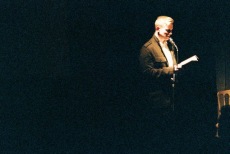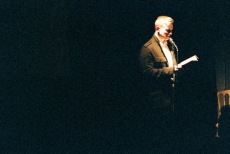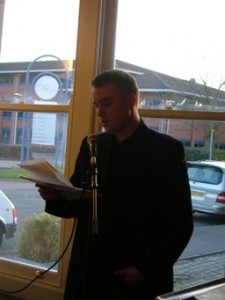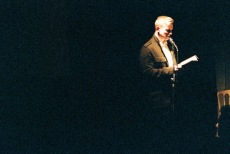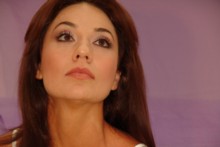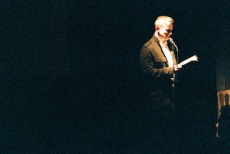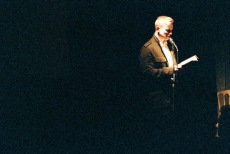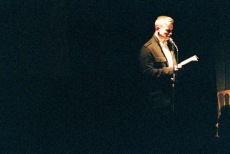Poetry International, in collaboration with 3:AM Magazine, is pleased to showcase a group of amazing young European poets. Steven Fowler, the Editor of the Maintenant Interview Series, began this project in January 2010 as a result of experiencing the differing, and inspirational, attitudes of European poetic cultures and how they contrasted to the UK. He said “I really thought it was a shame that poets from outside of the English language in Europe were never recognised until they had reached middle age and a certain ‘prominence’ in their own countries. I also wanted to present a truly representative sense of what poetry is for different traditions and methodologies, from the most traditional to the most avant garde. ”
We would like to extend a special thanks to the extensive list of those responsible for making this series possible. In particular, Jan Wagner, Eirikur Orn Norddahl, Jan Pollet, Nikola Madzirov and Damir Sodan.
*****
before you can sense it – there’s no difference,
taste discerns, God levels: he is
like the flavourless foam, like the odour of the
film booth – cement floors and gummy
carpets – just hope he won’t shock you if out of
curiosity you stick your finger between the gear teeth of that
projector, the one that shows this black
and white reality.
from Coffee and Cigarettes trans. Medeinė Tribinevičius
Donatas Petrošius is the arguably the finest Lithuanian poet of his generation. It’s perhaps easy to be complacent and forget the kind of change a nation like Lithuania has undergone in the last two decades. The largest of the Baltic states, in 1990 independence from the Soviet Union was declared. In 2004 Lithuania joined the EU. Within a space of twenty years, as a generation of new poets grew into maturity an absolute change has taken place in terms of poetic freedom and expression. Petrošius is the cultivated figurehead of this new voice and he follows in the footsteps of the grand Lithuanian poet of the twentieth century, Tomas Venclova, who can look eye to eye with Popa, Brodsky, Radnoti et al. Petrošius manages to retain the vernacular of Lithuanian dissent with the colloquialism and freedom of expression and experimentation that should define our own generation. For 3:AM he speaks to SJ Fowler.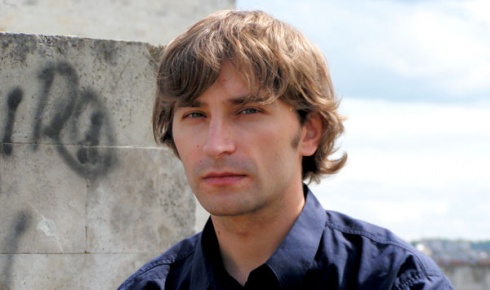 3:AM: Do you actively select subject matter for your poetry or are you more reflective, more fluid in your creative process?
3:AM: Do you actively select subject matter for your poetry or are you more reflective, more fluid in your creative process?
Donatas Petrošius: In my writing process I use all the possible methods available to me. All the material I can find, everything that fits. Occasionally everything comes from intuition, sometimes it is a rational action. I think that all methodologies are permissible and positive. It seems to me that each time I write I am recreating the lyrical subject matter of my poetry. There is no constant subject. I live in change. My aim is to expand the fields of the Lithuanian language, break the limits of speech, play with grammar, create my own syntax (as far as that is possible) and invent or construct new words or concepts within that language. The Lithuanian language is excellent for experimentation because of its free syntax and the endless amount of possible new word variants with prefixes, suffixes and so on.
For me every poem takes at least three years. The emotion and reflection disappear in the process of recreation. My emotional and biographical reality is not important – only the reality of language.
3:AM: Tomas Venclova has experienced a Western European spate of appreciation in recent years, like Tomas Salamun, Adam Zagajewski, Gyorgi Petri. As a younger Lithuanian poet what is your feeling towards his work?
DP: Tomas Venclova is one of the most important names in modern Lithuanian poetry. He is considered a master to almost everyone who writes poetry in Lithuania. He is legendary. Here in Lithuania we view him between two Nobel prize poets, his friends – Czesław Miłosz (who was born in Lithuania) and Iosif Brodsky (who lived in Vilnius for a while). It seems to me that you find many traditions coming through in Venclova’s poetry (Anglo-saxon, the Russian silver age and so on) and he often shares the same roots as ancient Greek and Latin (Roman) poetry forms. Also stoic philosophy, themes of exile. Tomaž Šalamun and Adam Zagajewski, both great poets, differ from Venclova, because they often use irony. Venclova’s lyrical subjects usually are cold, without foibles or weak points. He is alone and hard as a rock.
3:AM: Are you working in the same direction to him, or reacting against?
DP: Venclova is the one of few poets that I could declare to be my teacher. He is a perfect example how the classical form can subsume modern content. Otherwise, my poetical content is more like Šalamun – with ironical distance. While I am not reacting against Venclova, neither am I working in the same direction – I just do my work. I’m writing jokes, very serious jokes.
3:AM: Why do you think poets from outside of the central European tradition seem to become appreciated when they reach their elder years and not while they are young and still growing as poets?
DP: I’m happy that I’m still relatively unknown as a poet in Lithuania. When you are prominent, the media are constantly disturbing you. It’s better to be unknown. When I received the Writers union prize at the beginning of this year, for a just few weeks I had no peace. Fortunately, it didn’t last. I doubt I’ll ever be known across Europe. Certainly because of the difficulties in translation. It is impossible to translate poetry. You can translate poems, but not poetry. It lives in native Language. You can translate the good poems, but not the best ones. The Lithuanian language is very hermetic, difficult, unpopular. Fortunately there are a few longstanding Lithuanian poets that were born in English speaking countries. If Medeinė Tribinevičius (Canadian born Lithuanian writer/poet) has managed some good translations of my poems – all credit to her. A good translator sometimes makes things better than the original in translation.
The Central European countries were oppressed by communism for half a century. On the one hand – it was good for poetry –poets were taught to write in Aesopian language and masses of people admired poetry. Otherwise poets (the good ones) were outsiders with almost no chance to be known outside the iron border. The Berlin wall fell down in one motion, but to the people the change comes slowly and that’s normal. Irregardless, the fact is that Lithuania cannot find enough money to promote Lithuanian literature. If we had the same support as Swedish, Norwegian or Icelandic writers, more would be known about us.
3:AM: Do you feel you are able to break new ground in Lithuanian poetry, is there a palpable sense you are building a new tradition?
DP: It has been said to me that in anonymous poetry competitions it is easy to guess which poem has been written by me. Maybe I have developed my own way of writing. About building a new tradition – it is difficult to say. In the future we’ll see. There are but a few perfect poets in Lithuania, who have neither epigones nor too many followers (e. g. Antanas A. Jonynas).
3:AM: A reduced western European view might think the Russian or Polish traditions are highly influential on Lithuanian work, is this the case?
DP: To a certain extent Russian and Polish traditions are recognizable in contemporary Lithuanian poetry. But for ages the Russian and Polish cultures were trying to dominate Lithuania and to deny the Lithuanian language and culture. Since 1569 and the Lublin union, when Poland and the Grand Duchy of Lithuania became a Two Nation Republic, the Polish language became dominant. Until the 20th century some Lithuanian born poets wrote in Polish, though some tried to resist and prove that the Lithuanian language wasn’t crude or barbaric. After 1795 and the Russian occupation, Lithuanian books and newspapers were forbidden. In 20th century we had a war with Poland (for Vilnius in the 1920s) and several wars with the Soviet regime and for ages Lithuanians struggled against Polonization and Russification. Therefore only few intellectuals without feelings of national pride could read Polish and Russian literature. Only the dissidents made the connection between Russian, Polish and Lithuanian literature. Therefore for a long time the folklore, the Bible and the psalms were the only sources of Lithuanian literature for the people.
It should be mentioned, that since the 19th century there is a popular theory about the connection between Sanskrit and the Lithuanian language and it’s not a fictional theory. There are some writers who were influenced by Buddhist philosophy, sacred Hindu texts and Zen. Our one of the most influential modern poets, Vytautas Bložė, has for the last thirty years practised as a Krishnaist – but he declares that his poetry is influenced mostly by archaic Lithuanian (Baltic) folklore. Between 1920 and 1940, up until the Soviet occupation, we had a strong modernist and expressionist poetry school influenced by German poetry. There are traces of this still in postmodern Lithuanian poetry. We have Oskaras Milašius (Oscar Milosz 1887- 1939) a French poet and a Lithuanian diplomat. We have many poets, who escaped Soviet occupation in 1944 and moved to the USA, Western Europe, Australia, etc. Russian and Polish literature were great for such a long time but only in the last 20 years can we read them in Lithuania without fear. Now in Lithuania those who are younger than thirty years don’t speak Russian. We are becoming an English speaking country, in terms of a second language. Only a very small section of young Lithuanians can speak or read Polish. That is not good.
3:AM: Has that generation passed then, are you more engaged with Anglo American poetry? You have absolute access in the way previous generations did not.
DP: It is true, access to classic poetry is wonderful but now, if you are looking for something new you can discover in enormous amounts of poetical information. Sometimes I’m exploring Russian poetry sites, sometimes English. Democracy in art is no good. It should be a kind of hierarchy I think. It would be easier for those who are trying to understand. Now I personally am engaged with Latvian poetry (because I am learning Latvian), also Belarusian, Ukrainian and Russian. All these young people like us Lithuanians survived the Soviet regime. We survived this everyday absurdity, the ideological lies, the metaphysical evil. The other thing that unites us is the poetry of the free world – in Lithuania and all post-Soviet countries, young poets discover themselves and try to translate Anglo-American, European, Hispanic poetry – and everything from the languages that were forbidden to us in youth.
3:AM: Do you translate poetry into Lithuanian?
DP: Yes. Now I’m translating eight poets from different languages, but because I translate as slowly as I write, I’ll not publish my translations until maybe next year.
3:AM: What is the current reception for poetry in Lithuania with the public? Are you able to live as just a poet?
DP: I think it’s normal, as we have become an almost prosperous country. Poetry readership is around the three thousand mark – average for a country where there is no dictatorship. It’s wonderful when during the biggest poetry festival in Lithuania “Poetry Spring”, which travels to small provincial towns or villages – there are hundreds in the audience. Maybe sometimes there is no intellectual poetry reception but always there is a festival and there is an audience. Of course there are great intellectual poetry readers, we have universities with Algirdas Julius Greimas semiotic schools. We have even have a readership who do not not fear post-postmodernism and there are Lithuanian poets who are able to survive from poetry, translations, essays and criticism alone.
Me personally, I could survive without anything, because – sapienti sat. I can live on poetry alone, unknown or famous. I prefer living unknown. It is better for my poetry. Poetry is a secret way.
Check out the original interview at: www.maintenant.co.uk
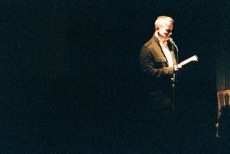 ABOUT THE INTERVIEWER:
ABOUT THE INTERVIEWER:
SJ Fowler is the author of four poetry collections, Red Museum (Knives Forks and Spoons Press), Fights (Veer books), Minimum Security Prison Dentistry (AAA press) and the Lamb pit (Eggbox publishing). He is the UK poetry editor of Lyrikline and 3:AM magazine, and has had poetry commissioned by the London Sinfonietta and the Tate. He is a full time employee of the British Museum and a postgraduate student at the Contemporary Centre for Poetic Research, University of London. www.sjfowlerpoetry.com – www.blutkitt.blogspot.com/ – www.youtube.com/fowlerpoetry


